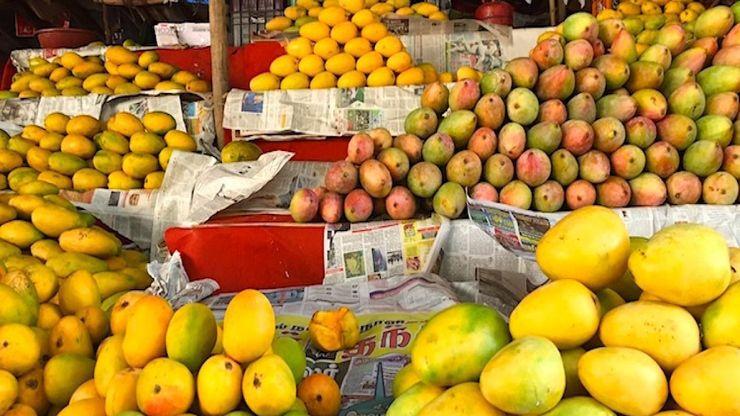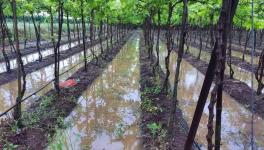UP: Malihabadi Dussehri Growers Incur Massive Losses; Annual Turnover Plunges to Rs 800 Cr From Rs 2,500 Cr

Lucknow: Hafiz Ali, a mango grower in Uttar Pradesh’s Malihabad, which is famous for its dussehri variety, is in distress after the second wave of the pandemic has hugely dented sales. Ali, who would load 2,000 baskets of mangoes into eight-nine trucks for Mumbai and Kolkata, is now forced to sell his crop at throwaway prices in the local market and 'mandi'.
Ali attributed the reason for price crash to weather vagaries and fake pesticides being used during cultivation. The dussehri mango crop requires a cold spell to reach the fruition stage from flowering, but humidity caused by sudden rains played spoilsport.
"Humidity caused due to unseasonal rains first led to black spots and then post-harvest anthracnose disease caused by fungus stopped the growth of mangoes, which turned black. Meanwhile, the remaining crop was attacked by caterpillars," Ali told NewsClick.
He said he had been in the business for over 40 years but had never witnessed such problems. The current price of dussehri mangoes, which have earned the Geographical Indication (GI) tag from the government, is the lowest in five years and is selling 60% cheaper than last year.
Another dussehri grower, Upendra Singh, said spraying pesticides is proving ineffective against insects due to fake pesticides. For three years, Singh has been spraying neem oil in his orchard on one side and insecticides on the other. He found 80% of the crop sprayed with neem oil was safe, while 80% of the crop where insecticide were sprayed got damaged.
"Organic farming is an expensive exercise. There are some medicines required during harvesting that work 100%. There are several companies in the market, but these products are three to four times more expensive than pesticides. Farmers will be able to buy these only if government gives subsidy. Also, several farmers are not even aware of these organic products. An awareness drive by the government is the need of the hour," Singh told NewsClick.
For the second consecutive year, growers in the mango belt of Malihabad, Kakori and Itaunja in Uttar Pradesh are experiencing massive losses due to the acute absence of buyers. Mango growers in the state are dismayed by coronavirus as exports to foreign countries have been stalled. About 45% of the fruit produced in Malihabad region is usually exported to the US, Gulf and European countries.
According to Insram Ali, president of the All-India Mango Growers Association, the annual turnover of dussehri used to be around Rs 2,000-2,500 crore per season. In the past two years, it has been reduced to Rs 600-800 crore only, leding to losses worth Rs1,400-1,500 crore. The crop area of mango in the three regions is around 27,000 hectares.
"The main occupation of around 90% population of Malihabad and Mall region is mango cultivation. The irony is that the situation of mango farmers has worsened and demand for dussehri has been decreasing every year despite the headquarters of the department for monitoring horticulture being located in Lucknow as also the Indian Council of Agricutural Research-Central Institute for Subtropical Horticulture," Insram Ali said, adding that at the wholesale market of Malihabad, the price of dussehri had fallen to Rs 10-15 per kg, which used to sell at Rs 30-40 per kg two years ago.
He said ever since the government reduced export subsidy from 26% to 10%, owners of mango orchards have been facing huge financial losses.
Commenting on the plight of the mango growers, S C Shukla, an agriculture scientist associated with the conservation of different species of mangoes, said he had learnt from mango growers that despite spraying insecticide 9 to 11 times during season, the insects do not die. They, too, have become mutants like coronavirus.
"Certainly fake drugs are being used. There is no proof of this, as drug inspectors never collect the sample and there are no labs for testing these," Singh said.
The agricultural expert said: "Severe winds that blow in the month of May and June play an important role in the excellent quality of dussehri. But this year, it rained about eight times. Due to surplus rainfall and flooding in the fields, there was moisture in the air, which reduced sweetness in the fruit by about 30-40%. If rains exceed five times, there will be more problems for dussehri.”
Get the latest reports & analysis with people's perspective on Protests, movements & deep analytical videos, discussions of the current affairs in your Telegram app. Subscribe to NewsClick's Telegram channel & get Real-Time updates on stories, as they get published on our website.
















